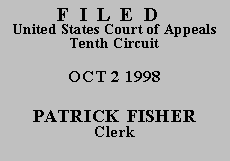

| UNITED STATES OF AMERICA, | No. 97-7130
(D.C. No. 97-CR-24-S) |
A sentencing court, rather than simply adopting the presentence report, must make "specific factual findings" to support an enhancement under U.S.C.G. §3B1.1(c). See United States v. Wacker, 72 F.3d 1453, 1476 (10th Cir. 1995). However, "if a defendant fails to object to his presentence report, he waives his right to challenge the district court's reliance on it, unless the district court's decision to do so amounts to plain error." United States v. Ivy, 83 F.3d 1266, 1297 (10th Cir. 1996).
In this case, Gordon failed to object to the presentence report, which contemplated that his sentence would be enhanced by two-levels, pursuant to U.S.S.G. §3B1.1(c). Therefore, absent plain error, Gordon waived his right to challenge the district court's reliance on the report.
The district court's adoption of the presentence report is not, as Gordon argues, a wrong application of the Guidelines so as to amount to plain error. The cases on which Gordon relies in support of this proposition, United States v. Occhipinti, 998 F.2d 791(10th Cir. 1993) and United States v. Smith, 919 F.2d 123, (10th Cir.1990), are unavailing.
In Smith, the Guidelines provided that the fine range for the defendant's offense was between $5,000 and $50,000. 919 F.2d at 125. The presentence report apparently incorrectly stated that the fine range was between $7,500 and $250,000. The court, relying on this error, fined the defendant $225,000. Id. Smith, therefore, was a case about the wrong application of the Guidelines based on the selection of an inappropriate fine range. It was not, like the case at a bar, about a factual dispute pertaining to whether the defendant's role in the offense warranted an enhancement in his sentence.
In Occhipinti, the court, citing Smith, noted that "application of the wrong Guidelines range constitutes plain error." Occhipinti, 998 F.2d at 801-02. Significantly, however, the court refused to reverse or remand because the sentence at issue did not involve a wrong application of the Guidelines range as such. Instead, it concerned a factual dispute about whether the defendant qualified as a "minimal participant" in the offense so as to merit a reduction in his sentence.
In United States v.Saucedo, 950 F.2d 1508 (10th Cir. 1991), we noted that a "factual dispute concerning the applicability of a particular guideline, not brought to the attention of the district court, does not rise to the level of plain error." Saucedo, 950 F.2d at 1518. Here, Gordon disputes the fact that he was "an organizer, leader, manager, or supervisor" of a drug conspiracy so as to justify the two-level enhancement under U.S.C.G. § 3B1.1(c). To the extent Gordon failed to raise the relevant objections at the trial level, we cannot find that the district court was in plain error when it enhanced his sentence under U.S.S.G. §3B1.1(c).
AFFIRMED. The mandate shall issue forthwith.
ENTERED FOR THE COURT
Carlos F. Lucero
Circuit Judge
*. The case is unanimously ordered submitted without oral argument pursuant to Fed. R. App. P. 34(a) and 10th Cir. R. 34.1.9. This order and judgment is not binding precedent, except under the doctrines of law of the case, res judicata, and collateral estoppel. The court generally disfavors the citation of orders and judgments; nevertheless, an order and judgment may be cited under the terms and conditions of 10th Cir. R. 36.3.
1. U.S.C.G. §3B1.1(c) provides for a 2-level increase in the offense level "[if the defendant was an organizer, leader, manager or supervisor in [a] criminal activity."